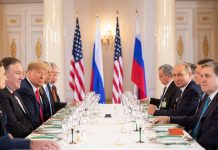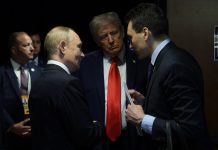In the history of politically organised society, propaganda serves as a tool for engineering public perception, opinion and reaction to events by creating an emotional cognitive environment that drives reflexive responses from the audience. Various key propagandists from the United States’ Committee for Public Information (CPI), such as Walter Lippmann and Edward Bernays, referred to the organised and conscious manipulation of public opinion as the ‘invisible hand’ that guided ‘democratic’ society. The importance of skilful propaganda is that it gives the illusion of free will and free choice in coming to cognitive conclusions about people, places, events and processes. Even if those cognitive conclusions have been carefully engineered through the deliberate and purposeful timing and tone of news coverage, the results can be unpredictable. In times of war and especially on the eve of a coming war, actors that are engaged in warfare create a deliberate and dangerous ‘fog of war’, cultivating politically expedient interpretations and projections of the physical space in order for the cognitive realm to arrive at the pre-determined conclusions that support intended conflict.
The current ongoing Russia-Ukraine War is not something that has just made a sudden appearance in February 2022. Rather, the process has been a gradual and incremental one; it can be termed as a creeping crisis. This idea of a crisis as an extraordinary situation is a useful companion of manipulation for emotions and perceptions that is the trademark of propaganda. The point and objective is to shift target audiences from individual, rational, and reasoned cognition towards reactional, emotional group impulses of the herd mentality kind.
The perception of an extraordinary situation is the basis for shifting what policies can be ‘justified’ or explained as being necessary to nominally resolve the crisis. Around every tangible crisis event are the intangible flows of information that give meaning and direction to the constructed event, and which are used to either restrict the operational choices of the target or to broaden the operational choices of the attacker and communicator.
Background to Contemporary West-Russia Relations
At the end of the Cold War in 1991, there was a critical moment of opportunity with the collapse of the bipolar global order based on confrontation to celebrate global peace and to create an inclusive global order. Instead, the West viewed this as their ‘victory’ in the Cold War and carte blanche to forcibly shape the world in their image of US global hegemony and a system of liberal democracy. This was echoed in academia too with slogans such as Fukuyama’s The End of History and its presumption that the world was inevitably going to become a subordinate image of the United States. Although the US had helped President Boris Yeltsin win the 1996 presidential election, Russia was under no illusion that it was not to be regarded as an equal or a partner.
Soviet leader Mikhail Gorbachev had been given guarantees from the US in 1989 that NATO would not move NATO into the former Warsaw Pact member states as a means to secure an uncontested reunification of Germany. The US has lied about not giving any such assurances that NATO would not expand eastward one single inch, which has been strongly rebuffed by Jack Matlock the former US ambassador to the Soviet Union and present at the meetings where the assurances were given. The concern over the potential repercussions of NATO’s continual eastward expansion in violation of the assurances given earlier were expressed by former US policy makers in an open letter to President Bill Clinton in 1997. The potential risks and hazards were clearly articulated in this letter, which has been ignored.
As regards the current conflict, one of the fundamental errors in judgement by the US-led West was the assumption that Russia would not likely recover from the Soviet collapse. Although Russia has a fraction of the Soviet Union’s economic and military strength, it has made significant progress in regaining a measure of political and economic stability as well as reforming its military in the 21st century. These changes and processes have occurred within the framework of larger processes and a re-thinking of Russia’s place in the world. Meanwhile the propaganda machinery that is Western mainstream media continues to peddle the image of a chaotic, weak and dangerous Russia that is simply not on par with the Western standard of living.
Two major global shifts have complicated the lives of propagandists, one geopolitical and the other political. After decades of Endless Wars, US economic, military, political and soft power has been severely battered. It can also be one of the mechanisms that has initiated a transformation in the global geopolitical configuration from a Western-centric and US-unipolar order towards a non-Western-centric multipolar order. Simultaneously there is a severe crisis being experienced within the political establishment’s system of liberal democracy. Both of these systems are part and parcel of the system that upholds US global power and influence. This has set the course for collision and confrontation between the West and Russia.
The Rollercoaster To ‘Inevitable’ Confrontation
Avoidable and unnecessary is the path taken to the current so-called New Cold War, which has been fuelled by the US and its increasingly aggressive defence of its global position as evidenced by Joe Biden’s commentary on the need to “take back” global leadership. This is ‘complemented’ by Russia’s path towards being more assertive in pursuit of its independent foreign and security policy interests, and in moving increasingly away from the Western order. This created an inevitable clash between the West and Russia, should the US continue to push NATO’s expansion even further east. The first open clash came in the summer of 2008 in the form of the Georgian-Russian War, when President Dmitry Medvedev warned of Russia’s two red lines on NATO membership – Georgia and Ukraine. In the wake of the US and EU supported regime change in Kyiv in 2014, and before the Russia-Ukraine War, these warnings have been restated, including against using countries such as Ukraine to fight a NATO proxy war against Russia owing to the potential disastrous results that are likely to occur. However, moderate and critical voices are systematically excluded from the mainstream mass media in order to maintain a simplified dialectical narrative of good versus bad. A simple narrative, even when it is false, is easier to understand and accept. Plausible and simple falsehoods are the trade of effective and influential propaganda.
There has been a façade of diplomacy by the US since the heating up of the ‘Ukraine crisis’ from November 2021. This has been designed to thwart concrete and positive diplomatic progress and intended instead as a public relations stunt designed to paint Russia as an aggressive actor that cannot be negotiated with (even though there was no intention by the US to negotiate).
A number of parallels were drawn in the lead up to the current Russia-Ukraine War, including reflections on the path of the 2008 Georgia-Russia War scenario when the US and its allies trained and equipped Georgia for “defensive” measures. This created the perception that, in the event of open armed conflict, NATO may support them against Russia. As noted by John Mearsheimer and others, rather than acknowledging the West’s complicity in helping to create the current humanitarian disaster, Russia is blamed for being the sole responsible aggressor and Ukraine is presented as the hapless victim.
The propaganda narrative used is to speak of Ukraine’s sovereign right to choose its own security path, in spite of the obvious mechanisms of US control in the state structures, including US citizens serving in the Ukrainian government. Ukraine became a mechanism with which to punish Russia in a number of ways, to push its influence from Ukraine, to reduce the level of German independence from US policy, and to keep its influence out of Europe. As such, Ukraine has been the means to bait Russia into making a strategic mistake in order to legitimize the intended policy of Russian isolation and containment. The obvious and abundant use of propaganda by omission of context by the US is clear, but this is a highly dangerous game of deception and may in fact lead to self-deception and an even larger strategic mistake than Russia’s invasion of Ukraine. For the time being the propaganda of fear has a new focus, away from the Coronavirus pandemic to a new level of war hysteria that the West has contributed to. But this cannot yet be seen by many, through the pathos laced propaganda campaign that demands the public look at the latest global enemy number one, and not to be wary of what the weak and threatened political elite of the West are capable of doing and have already done. This was amply demonstrated during the harmful and totalitarian policies conducted in the name of public health during the pandemic.
The current geopolitical game, with its heavy use of propaganda, might have catastrophic results. It is one that has resulted in more emotionally based decision-making reflex by Russia and this is dismissed as being “absurd” or “irrational” when there is a clear emotional logic to it. The US has not learned this lesson and thrown caution to the wind as now Russia’s nuclear forces on put on high alert. All lessons and reason from the 1962 Cuban missile crisis have been forgotten as the US is under the delusional and dangerous self-belief that they are about to win another war. Pragmatism and common sense are being trumped by a messianic ideological illusion that is powered by the West’s belief in its own propaganda.
(Featured Image: “File:Putin, Macron, Merkel, Zelensky (2019-12-10) 01.jpg” by Пресс-служба Президента Российской Федерации is marked with CC BY 4.0.)





